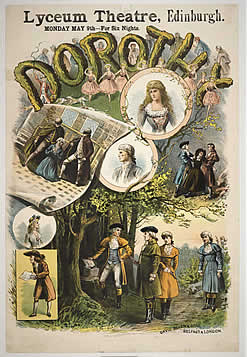 |
 |
||||||
 |
Dorothy is a comic opera in three acts written by B.C. Stephenson and composed by Alfred Cellier. It was first produced at the Gaiety Theatre, London, on 25 September 1886 but transferred to the Prince of Wales Theatre on 20 December 1886 with two important cast changes — Marie Tempest replaced Marion Hood as Dorothy and Ben Davies was cast as Geoffrey. It then took off and played for 931 performances, breaking every London long-run record, including all of the Gilbert and Sullivan operas. The show also toured for decades in Britain, with four or five separate and simultaneous companies during the early years.
Set in rural Kent in 1740, the plot surrounds the Squire's daughter, Dorothy and her cousin Lydia, who, tired of the social rounds, decide to pose as villagers during the festival of the Hop Pole, (An annual celebration occurring in the vicinity of the Hop Pole Inn), at the end of the Hop picking season. It so happens that Geoffrey, a "young English gentleman", and his friend Harry, under assumed names, are using the Hop Pole Inn as a hideout to escape Lurcher, a Sheriff's officer who has been chasing them with a bundle of writs. The men and girls are mutually attracted but neither pair knows the other's true identity. Lurcher arrives on the scene and is tricked into posing as a servant to the two men when they visit the house of the Squire. There is a faked burglary, Lurcher dines too well, identities are exposed, but the end is obvious and happy.
The principal numbers are the ballad, "With such a Dainty Dame;" the song of "The Sheriff's Man" by Lurcher, Wilder, and Sherwood; the quartette "You swear to be Good," and the jolly chorus "Under the Pump," in the first act; the introduction and country dance, the bass song by Bantam, "Contentment I give you," and the ballad, "I stand at your Threshold," sung by Sherwood, in the second act; and the chorus of old women, "Dancing is not what it used to be," Phyllis's ballad, "The Time has come when I must yield" and the septette and chorus, "What Joy untold," leading up to the elaborate finale of the last act.
- The Story — a detailed plot summary.
- Dramatis Personæ — the original cast members.
- MIDI Files — both MIDI and MIDI Karaoke files for the entire opera, prepared by Colin Johnson
- Vocal Score — the full vocal score scanned for these pages by Adam Cuerden.
- A hand-written copy of the overture as pasted into the front of J M Gordon’s annotated prompt vocal score, courtesy of Ian Bond.
- Lyric booklet for the opera as published for the 817th performance of the opera on 17th December 1888, courtesy of Ian Bond.
- J C Williamson prompt book for the opera as presented on tour throughout Australia, courtesy of Ian Bond.
- Dorothy Picture Gallery — three pages of photographs from various Dorothy productions.
Page modified 10 Feb 2019